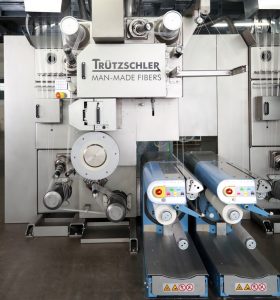
Technology companies innovate to solve problems for the man-made fiber industry.
TW Special Report
The origins of the man-made fiber industry go back as far as the 1800s. But famously, it was the discovery of nylon by DuPont chemist W.H. Carothers almost 90 years ago that truly launched the industry. Polyester soon followed nylon; and in the years since those early discoveries, many more man-made polymers have been developed. There are lots of processes for turning these polymers into a useable fiber form, as well as downstream processes for imparting desired fiber properties. Man-made fiber technology companies continuously work to innovate for the sector, reacting to industry trends and needs.
Read on to learn about some of the latest technologies developed for the man-made fiber market.
Spinning Plants, Lines
Italy-based 4M Plants S.r.l. offers multifilament spinning plants designed for maximum flexibility and ergonomics. Its compact spinning lines are suitable for polyester and polypropylene (PP) continuous multifilament partially-oriented, fully-drawn and high-tenacity yarns. The OMNIA series offers fast installation and parameter setup to maximize return on investment and reduce production costs even on small lots. 4M reports its “plug, run and earn” claim is its standard and not merely marketing. The smallest standard Omnia may be installed and entered into production within one day.
4M’s standard spinning machine is a single-sided plant with a single extruder up to 60/30 and from 2 to 6 spinnerets. 4M also offers the Mirror spinning machine — a double-sided machine featuring multiple extruders up to 90/30 and up to 6+6 spinnerets.
All plants are fully customizable and are equipped with intuitive software with a touch-screen interface. 4M builds and tests each machine for at least week under production conditions before delivering the technology to its customers.
In order to accelerate its expansion strategy in the polymer processing market with complementary offerings, Switzerland-based Oerlikon recently entered into an agreement to acquire Italy-based INglass S.p.A., a producer of high-precision polymer flow control equipment. Once the transaction is complete, the company will rename the Oerlikon Manmade Fibers division — comprised of the Oerlikon Barmag, Oerlikon Neumag and Oerlikon Nonwoven brands in addition to INglass — the Polymer Processing Solutions division. This division will be further divided into two business units: Flow Control Solutions, which will combine Oerlikon Barmag’s gear metering pumps business with INglass’ HRSflow operations; and Manmade Fiber Solutions, which will continue its focus on plant and engineering solutions for polyester, PP and nylon production. The deal is expected to close in the second quarter of 2021.
“We see great potential for growth in our new Flow Control Solutions business unit,” said Georg Stausberg, Polymer Processing Solutions Division CEO and member of the executive committee of the Oerlikon Group. “The businesses form the two core growth pillars and benefit from each other in global market development, in modern and digitized production, and in customer services. We also see potential synergies in R&D by combining existing know-how in the field of polymer processing.”
Since ITMA — when Oerlikon debuted the compact eAFK Evo texturing machine developed in conjunction with Unifi Inc., which features a very short twisting zone and EvoCooler cooling component — the company has introduced updated AS H 32 and AS H 38 yarn suction devices/hand injectors, which are standard components on all spinning positions. The devices offer the same yarn tension using lower compressed air consumption, an ergonomic compressed air valve and the ability to make finer adjustments to the yarn suction force in applications needing a high suction performance. Oerlikon reports the devices have been in operation for some months in several pilot projects — a tape yarn system located in the United States and in a bulk continuous filament (BCF) yarn application in Europe.
Germany-based Trützschler Man-Made Fibers recently introduced the MO40-E four-thread extrusion system — a flexible solution for spinning both standard and high count BCF carpet yarns using polyethylene terephthalate (PET), nylon or PP. The machine is a sibling of the MO40-C BCF extrusion system introduced at ITMA 2019 and part of its Optima family of compact spinning solutions offering high production output per square meter of floor space.
The MO40-E was designed for high count yarns with the smallest single filament titres to meet the demand for smooth, velvety surfaces in carpet production. The MO40-E increases the maximum number of individual filaments by 50 percent up to 750 filaments. A widened quenching cabinet ensures cool process air evenly reaches all individual filaments so still hot and soft filaments do not stick together after exiting the larger spinnerets.
In addition to the niche high-count yarns, the MO40-E can produce standard BCF yarns with titres of 3 denier per filament or more. Its working window ranges from 500 to 7,000 dTex. For standard production, an adapter allows a standard spin pack to be inserted into the spin beam. Four ends can be spun and wound simultaneously on bobbins.
Trützschler reports it soon will grow the Optima family with the TO40, a tri-color BCF extrusion system currently in development. This TO40 integrates smartFLEX components into the Optima platform to simultaneously process three different colors of polymer chips for tri-color yarns to be used in mélange and contemporary sprinkled carpets.
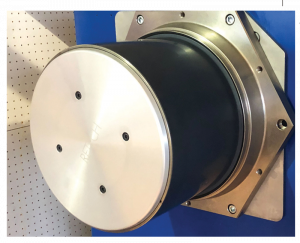
Spinning Components
Switzerland-based Retech AG is a specialist in components and godet rolls for heating and drawing man-made fibers, as well as yarn tension monitoring devices. The company recently introduced two new godet rolls — the Ø 250 mm model developed for technical yarns, and the Ø 320 mm model designed for high-performance fibers such as aramids.
The Ø 250 mm godet roll features an ideal yarn length of 420 millimeters (mm) for processing eight or 12 threads at a time. According to Retech, the extended 250-mm-diameter allows for higher speed with the same dwell time — with speeds of up to 6,500 meters per minute (m/min) possible while applying a torque value of 15Nm through the full speed range. The godet roll reaches a temperature of 250°C with a temperature profile of ± 1.5°C over the working width of the roll. According to the company, these upgrades make it possible to process a wider range of yarn counts compared to its predecessor, the Ø 220 Series.
The Ø 320 mm model features various lengths that are ideal for serpentine yarn paths to multi-enlacement, but suit practically all machine types and yarn paths, according to Retech. To allow optimal processing of high-performance yarns, the godet roll features an extended dwell time, influenced by speed and diameter, to optimize heat entry into the yarn. The roll offers temperatures of up to 400°C, torque values of 35 Nm, and speeds of up to 1,500 m/min.
According to Retech, yarn manufacturers can be secretive about applications and new product developments, so it can be difficult to determine exact characteristics and requirements driven by the industry. “Comparing required customized solutions shows us trends regarding the market demand for godet rolls,” said Ralph von Arx, Retech CEO. “It becomes our ambition to innovate the one godet roll meeting these latest customer needs. We continuously touch today’s technical limits and stretch to tomorrow’s possibilities when developing. We take the risk, and try to optimize at the edge.”
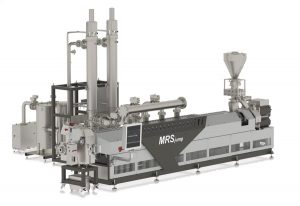
The MRSjump from Gneuss offers decontamination and intrinsic viscosity control in one step.
Recycling post-consumer PET plastic bottles into new fibers is a well-established process. However, the processes used to recycle such materials don’t effectively handle other post-consumer PET sources, such as post-industrial fiber waste without implementing additional processes downstream from the extruder to resolve unacceptable mechanical properties. Germany-based Gneuss Kunstsofftechnik GmbH attempts to solve this problem with the Gneuss MRSjump extruder for PET, which offers decontamination performance and intrinsic viscosity (IV) control in one step.
According to the company, the decontamination performance of its MRS PET extruder has been enhanced with an increased surface exchange rate under vacuum so that partial polycondensation takes place within the extruder maintaining the input IV. The MRSjump also can maintain the inevitable residual moisture level variations of the input material by controlling the long residence time of the polymer under vacuum and the intense devolatization. Materials do not need to be pretreated and there is no additional melt or solid phase IV boosting process needed post-extrusion.
Gneuss reports the advantages of the MRSjump include the possibility to recycle previously unrecyclable materials, improved material quality, greater flexibility, smaller machine footprint, lower energy consumption and more simple operation.
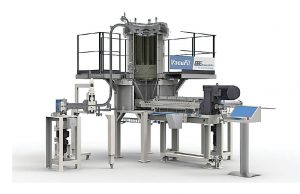
Germany-based BB Engineering was established more than two decades ago as a joint venture between Oerlikon Barmag and Brückner Group GmbH. The company specializes in construction, engineering and production of machine components and complete systems for films and yarn. The company recently added the Visco+ vacuum filter for targeted IV setting to its melt filter portfolio. The large area vacuum filter was designed to produce a homogenous, pure melt when processing PET production waste, but also offers a homogenous viscosity when using virgin raw materials.
Visco+ is part of BB Engineering’s VacuFil recycling system, but also now is offered as a separate and easily integrated upgrade to existing systems. In addition to decontamination, the Visco+ offers IV homogenization if an existing production system is struggling with fluctuations, as well as IV increases without the negative impacts associated with long residence times. The Visco+ operates like a liquid-state polycondensation unit, and BB Engineering reports a unique patented process “enables fast and flexibly-controllable viscosity build up and reliable viscosity monitoring of the polyester melt.” Contamination is effectively removed from the starting material using an automatically regulated high-performance vacuum that operates between 1 and 30 mbar.
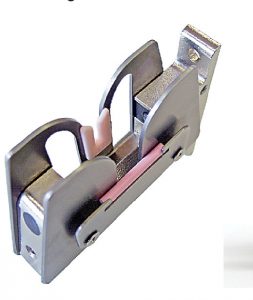
Testing Instruments For Man-Made Fibers
England-based Saurer Fibrevision Ltd. — represented in the United States by Fi-Tech Inc., Richmond, Va. — offers the Fibrevision FibreTQS for ATY Control. This advanced quality monitoring system offers total control for the air textured yarn (ATY) process using a single optical sensor to measure a range of parameters including bulk diameter and denier variation. FibreTQS characterizes the core and loop structure of the yarn in order to assess quality; as well as short-term variation in the yarn profile to identify general process instability, slubs or thin places that can result from jet contamination. The FibreTQS both improves the quality of first-grade yarns and also results in a lower percentage of second quality packages and reject yarn by identifying steady state bulk or texture faults that are a major cause of downstream processing problems usually only identified by knit and dye tests.
Data from the sensors shares quality fault and summary data distributed in sections with the FibreTQS PC software, which stores data for each package produced and can generate user-friendly reports.
Greenville, S.C.-based Measured Solutions Inc. represents suppliers of spinnerets, spinneret cleaning equipment and inspection systems, and testing instruments. The company offers its services — including sales, service and ISO calibrations — to the fiber and yarn industry in North America, Central America and parts of South America.
Textechno Herbert Stein GmbH & Co. KG, Germany, represented by Measured Solutions, has introduced the MDTA4 — the latest generation of its micro dust and trash analyzer for cotton or man-made fibers including recycled fibers. The instrument measures fiber length, diameter, neps, fiber to metal cohesion, and fiber to fiber cohesion, among other properties. The tester also can produce a sliver for further testing or sample yarn spinning. Textechno also offers the COVAMAT automatic capacitive evenness tester for filament yarn. Covamat features an integrated 24-position automatic package changer. Textechno also recently updated all its instruments — including the Statimat, Dynafil, Texturmat, Favimat+ and Covafil —to the latest Windows 10 operating system.
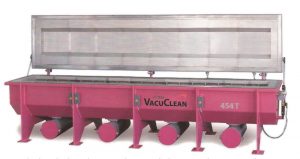
Germany-based Schwing Fluid Technik GmbH, also represented by Measured Solutions, has expanded its VacuClean range of spinneret and filter cleaning systems. The new units include a smaller Compact VacuClean, and larger vertical systems to clean candle filters.
Another company represented by Measured Solutions, New York City-based Aspex Inc., is the maker of the SpinTrak™ System — a fully automatic spinneret inspection system. The SpinTrak recently was updated with new Windows 10 software and offers a new Multi-Scan multiple hole inspection feature for staple fiber applications.
In addition, Zurich-based Rothschild Instruments, represented by Measured Solutions, recently launched the MEMO-TENS R-3010 — a small, light, portable electronic tensiometer. This new concept for yarn tension measurements on multiple yarn production machines is suitable for fast data acquisition in the whole plant, according to the company. The company’s previous tensiometers were comprised of three components — measuring electrode, electronic tensiometer, and a PC or laptop — that had to be moved in a plant using a trolley and required access to an electric power source. The new tensiometer, on the other hand, features miniaturized electronics that allows all parts to be combined in one compact head measuring 30 x 160 mm and weighing 220 grams. The MEMO-TENS R-3010 plus a lightweight tablet are easily carried around the manufacturing plant to record measurements as needed. The instrument has a measuring range of 0 to 1,000 centiNewtons and enough memory for up to 150 position measurements.
May/June 2021




